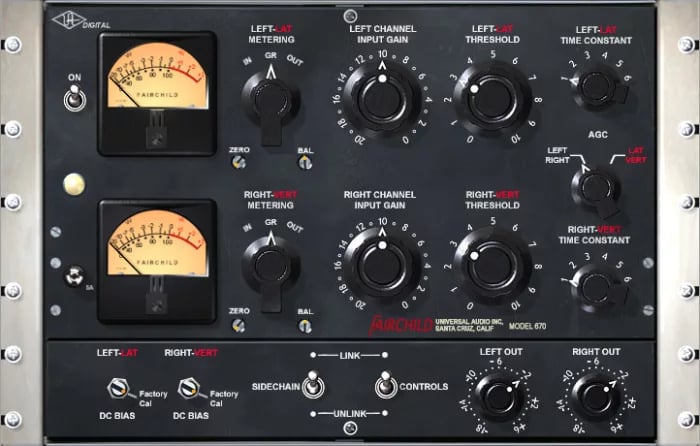The Fairchild Compressor: A Legendary Sound Shaped by Tubes and Time
Discover the timeless legacy of the legendary Fairchild compressors, renowned for their warm tube-driven sound. Explore their origins, features, and impact on music history.

window.\_\_hsEnvConfig = {"hsDeployed":true,"hsEnv":"prod","hsJSRGates":\["CMS:JSRenderer:SeparateIslandRenderOption","CMS:JSRenderer:CompressResponse","CMS:JSRenderer:MinifyCSS","CMS:JSRenderer:AvailableTranslationsHook","CMS:JSRenderer:GetServerSideProps","CMS:JSRenderer:LocalProxySchemaVersion1","CMS:JSRenderer:SharedDeps"\],"hublet":"na1","portalID":6987947}; window.\_\_hsServerPageUrl = "http:\\u002F\\u002Fprivate-na1.hubapi.com\\u002Fcos-rendering\\u002Fv1\\u002Finternal\\u002Frender\\u002F164011397478?portalId=6987947&preview=true&is\_content\_buffer=true"; window.\_\_hsBasePath = "\\u002Fcos-rendering\\u002Fv1\\u002Finternal\\u002Frender\\u002F164011397478";
window.\_\_hsEnvConfig = {"hsDeployed":true,"hsEnv":"prod","hsJSRGates":\["CMS:JSRenderer:SeparateIslandRenderOption","CMS:JSRenderer:CompressResponse","CMS:JSRenderer:MinifyCSS","CMS:JSRenderer:AvailableTranslationsHook","CMS:JSRenderer:GetServerSideProps","CMS:JSRenderer:LocalProxySchemaVersion1","CMS:JSRenderer:SharedDeps"\],"hublet":"na1","portalID":6987947}; window.\_\_hsServerPageUrl = "http:\\u002F\\u002Fprivate-na1.hubapi.com\\u002Fcos-rendering\\u002Fv1\\u002Finternal\\u002Frender\\u002F164011397478?portalId=6987947&preview=true&is\_content\_buffer=true"; window.\_\_hsBasePath = "\\u002Fcos-rendering\\u002Fv1\\u002Finternal\\u002Frender\\u002F164011397478";
Introduction
In the world of audio recording, few pieces of equipment have left as indelible a mark as the Fairchild 660 and 670 compressors. Developed in the late 1950s by audio pioneer Rein Narma under the auspices of Sherman Fairchild's eponymous company, these tube-powered marvels helped define the sound of countless classic recordings across multiple genres. Six decades later, the Fairchild remains a holy grail for engineers and producers seeking to imbue their tracks with its inimitable warmth, musicality, and vintage vibe.
Origins of an Icon The story of the Fairchild compressor begins in the early 1950s with Rein Narma, a gifted Estonian-American audio engineer who had already made a name for himself building mixing consoles for guitar legend Les Paul. Narma's innovative compressor design caught the eye of Sherman Fairchild, an entrepreneur and inventor with a passion for audio technology. Recognizing the potential of Narma's creation, Fairchild licensed the design and brought Narma on board as chief engineer for his newly minted Fairchild Recording Equipment Corporation.
In 1959, the company unveiled the Fairchild 660, a mono compressor that quickly garnered accolades for its transparent sound and became a staple in top recording studios of the era. Hot on its heels came the stereo 670 model, which allowed for independent compression of left and right channels and would go on to become the most revered and sought-after of the two units.
Under the Hood
At the heart of the Fairchild's magic lie its 11 (660) or 20 (670) tubes, which imbue the units with their celebrated warm, rich tonality. The compressors employ a unique variable-mu design with a single push-pull amplification stage and an exceptionally high control voltage. This allows for lightning-fast attack times—as quick as 1/10,000th of a second—and a signature soft-knee compression curve that gradually transitions from gentle compression to hard limiting.
The Fairchilds boast an array of features that set them apart from their contemporaries. Six selectable release time constants, including several that provide automatic variable release based on program material, grant engineers unparalleled control over the character of the compression. The units can function as either a compressor with a gentle 2:1 ratio and low threshold, a limiter with a steeper 30:1 ratio and high threshold, or anything in between. Stereo linking and lateral/vertical processing on the 670 further expand the creative possibilities.
This potent combination of design elements enables the Fairchilds to deliver wonderfully transparent gain reduction and a larger-than-life sound that can elevate anything from vocals to drums to entire mixes.
Legacy and Legendary Users
The Fairchild compressors, particularly the 670, rapidly became studio mainstays in the 1960s and 70s, leaving their indelible mark on countless landmark recordings. At London's famed Abbey Road Studios, engineer Geoff Emerick deployed the 660 extensively on albums by The Beatles, most notably to sculpt Ringo Starr's instantly recognizable drum tones and to craft the otherworldly compressed drum sound on the track "Tomorrow Never Knows".
Over the ensuing decades, the Fairchilds would grace the recordings of a veritable who's who of music icons, including Pink Floyd, The Rolling Stones, Jimi Hendrix, Adele, Bob Dylan, Ray Charles, and countless others. Renowned producers like Quincy Jones, Jack Joseph Puig, and Tony Maserati have also cited the Fairchild as an indispensable part of their sonic toolkit.
Rebirth and Emulation
With original Fairchild units now commanding princely sums of $30,000-$50,000 or more on the used market due to their scarcity and sterling reputation, experiencing the magic of these devices first-hand has become a rarefied prospect. However, the sound and design of the Fairchilds have inspired a slew of modern hardware reproductions and software emulations.
Boutique audio companies such as Retro Instruments, Tube-Tech, and Heritage Audio have introduced meticulous hardware recreations that deliver the essence of the Fairchild sound at a more attainable price point. In the software realm, Universal Audio, Waves, IK Multimedia, and others have developed highly acclaimed plugin emulations that allow a broader swath of engineers to harness the Fairchild mojo in the box.
One particularly noteworthy emulation is Universal Audio's Fairchild Tube Limiter Collection for their UAD powered plug-ins platform. Meticulously modeled on a pristine-condition 670 unit from Ocean Way Studios, this plug-in faithfully captures every nuance of the original hardware, from its complex tube gain structure to its multifaceted compression curves. With the included 660 mono and 670 stereo models, UAD has brought the Fairchild experience to a new generation of creators.
Over 60 years since their introduction, the Fairchild 660 and 670 compressors remain the gold standard of vintage tube compression and an enduring part of recording history. Their smooth, colorful, and forgiving character continues to be cherished by top-tier engineers and producers across all genres who appreciate the unmistakable touch of classic analog warmth they bring to a track.
While the original units may be out of reach for all but the most well-heeled audio professionals, the proliferation of high-quality hardware and software emulations has made the once-exclusive Fairchild sound more accessible than ever before. As a result, the legacy of these iconic compressors is sure to endure, shaping the tone of great recordings for generations to come.